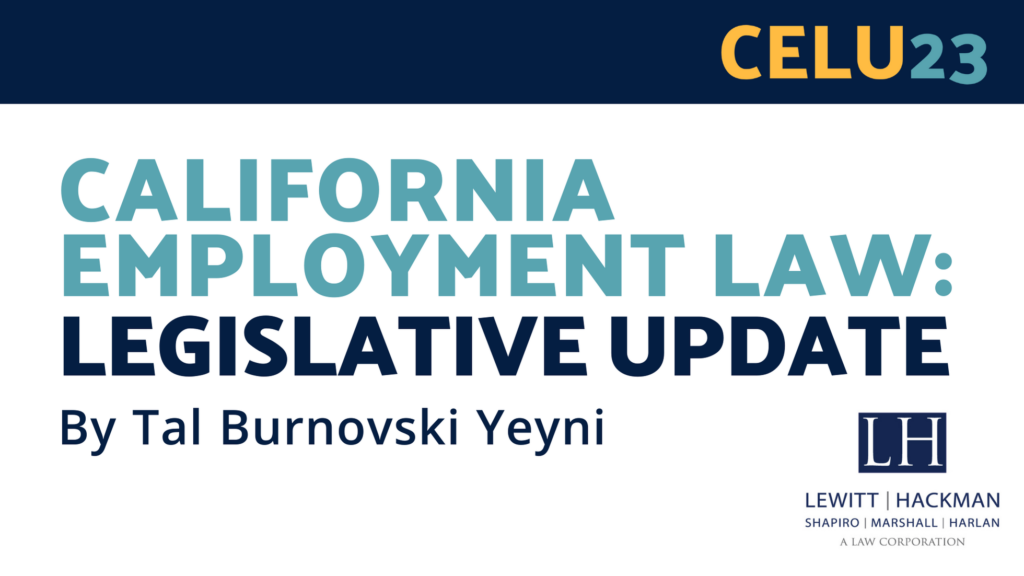California Employment Law: Legislative Update
California Employment Law: Legislative Update

| Below is a summary of several prominent bills signed by Governor Gavin Newsom this legislative season.
Senate Bill 616: Expanding paid sick leave entitlements SB 616 increases these amounts. Starting January 1, 2024, employees will be entitled to 40 hours or five days per year. The new cap on accrual will be 80 hours or 10 days. If employers utilize a different accrual method (other than one hour per 30 hours worked), the accrual must be at a rate such that employees accrue no less than 40 hours or five days of paid sick leave by the 200th calendar day in each year. Employers may also front load the full 40 hours at the beginning of each year (calendar, anniversary, or a defined 12-monht period). SB 616 does not preempt local ordinances that provide different accrual/carry over limits. This means that employers must comply with the rules most preferable for employees. For example, the City of Los Angeles Sick Leave Ordinance provides at least 48 hours of paid sick leave to employees working in the City. Other cities have different paid sick leave rules as well, so the one most favorable to the employees in those jurisdictions must be followed.
Senate Bills 428 and 553: Prevention of workplace violence Generally, under existing law (Code Civ. Proc. 527.8), an employer can request a restraining order on behalf of employees who are victims of violence or the subject of a credible threat of violence. This, per the author, limited an employer’s ability to seek a restraining order, until a situation escalates and reaches the point of violence or credible threat of violence. With the passing of SB 428 and 553, starting January 2025, employers can intervene sooner on behalf of their employees, before the harassing conduct escalates. SB 553 further requires all employers, as of July 1, 2024, to create and maintain a written “effective workplace violence prevention plan.” Workplace violence means “any act of violence or threat of violence that occurs in a place of employment” including:
Lawful acts of self-defense or defense of others are excluded. Employers must record every workplace violence incident in a “violent incident log” (without identifying information) and provide annual training (and re-training as needed) to employees about the plan. Records and incident logs must be maintained for a minimum of five years. Training records must be maintained for a minimum of one year. Employees and their representatives may request a copy of the records created.
Senate Bill 848: Protected time off due to reproductive loss To be eligible for leave under SB 848, employees must be employed for at least 30 days prior to commencement of the leave. Employers can limit reproductive loss leave to be completed within three months of the event. The leave does not have to be taken on consecutive days. Furthermore, SB 848 provides that reproductive loss leave does not run concurrently with other applicable leaves. An employer is not required to provide paid time off for this purpose, but employees are entitled to use vacation, personal leave, accrued and available sick leave, or other compensatory time off that is otherwise available to the employee. As with other leave laws, SB 848 protects employees from retaliation and prohibits employers from interfering, restraining, or denying an employee’s right for reproductive loss leave.
Assembly Bill 933: Privileged communications regarding sexual assault, harassment, or discrimination AB 933, which was drafted following former Assemblymember Matthew Dababneh’s defamation lawsuit against Pamela Lopez (who accused him of sexual assault), now protects “communication made by an individual, without malice, regarding an incident of sexual assault, harassment, or discrimination” and awards attorney’s fees, costs, and treble damages to a prevailing defendant. A protected “communication” under AB 933 is defined to include factual information related to “an act of workplace harassment or discrimination, failure to prevent an act of workplace harassment or discrimination, aiding, abetting, inciting, compelling, or coercing an act of workplace harassment or discrimination, or an act of retaliation against a person for reporting or opposing workplace harassment or discrimination.”
Assembly Bill 594: Expanding enforcement actions for Labor Code violations As part of the tools AB 594 provides, public prosecutors may seek injunctive relief to prevent additional violations and may be awarded reasonable attorney’s fees and costs. Further, AB 594 clarifies that any arbitration agreement between a worker and an employer does not limit and has no effect on the authority of the public prosecutor or the Labor Commissioner to litigate violations of the Labor Code. This law remains in effect until January 1, 2029, unless extended.
Senate Bill 497: Creates a rebuttable presumption of retaliation SB 497 expands these protections and provides that any action taken against an employee within 90 days of the protected activity creates “a rebuttable presumption in favor of the employee’s claim.” SB 497, which amends Labor Code Section 1102.5 (whistleblower protections), also clarifies that for each whistleblower retaliation, an employer may be liable for up to $10,000 per employee. What this means is that it will be easier for employees to allege retaliation claims against employers. Timely and accurate documentation of employee misconduct is essential in defending any such claims.
Assembly Bill 1228: Higher minimum wage and creation of council for fast food workers AB 1228 is a compromise between labor groups and restaurant associations concerning fast food establishments. The bill increases the minimum wage for fast food restaurant employees to $20 per hour, starting April 1, 2024. The bill also revives the Fast-Food Council (originally established in AB 257, which was halted due to a referendum measure) for the purpose of establishing minimum standards on wages, working hours, and other working conditions for fast food restaurant employees. AB 1228 does not empower the Council to create new paid time off benefits for fast food restaurant employees and does not permit cities or counties to create local ordinances or regulations applicable to fast food restaurant employees. Local jurisdictions, however, may still establish a minimum wage that is generally applicable to all industries.
Senate Bill 525: Higher minimum wage for health care workers At the end of each schedule, wages will increase by the lesser of 3.5 percent or the applicable Consumer Price Index.
AB 1355: Electronic delivery of tax and EDD documents AB 1355 amends these laws to permit employees to “opt-in” to receive electronic notifications related Tax Credit or unemployment benefits. This, per the sponsor of the bill, would allow “California employees and employers to be more environmentally conscious.”
Senate Bill 723: Extending “right to recall” for employees in the hospitality and service industry SB 723 extends the deadline to December 31, 2025. The bill further revises the definition of “laid-off employee” to mean any employee who was employed for six months or more and whose employment ended on or after March 4, 2020, due to a reason related to the COVID-19 pandemic. The revised definition creates a presumption that the separation occurred due to COVID-19, unless the employer “establishes otherwise by a preponderance of the evidence.” Covered employers who have new positions should be mindful that until December 31, 2025, they must offer previously laid off employees (if eligible) all positions for which they are qualified to perform.
Assembly Bill 647: Recall rights for covered grocery workers
Senate Bill 700: Protected off-duty cannabis use SB 700 adds to these protections and prohibits employers from requesting information from an applicant relating to the applicant’s prior use of cannabis. If information about an applicant’s prior use of cannabis shows up on a background check report, SB 700 prohibits employers from considering this information, unless permitted to consider or inquire about prior cannabis use under applicable law.
Senate Bill 699: Invalidates out-of-state non-compete agreements The signed bill expands this prohibition to any non-compete provisions regardless of where and when the contract was signed. Per the declared purpose of the bill, this is to protect “the freedom of movement of persons whom California-based employers wish to employ to provide services in California, regardless of the person’s state of residence.” As further deterrence against non-compete restrictions, SB 699 provides that current, former, or prospective employees have:
Assembly Bill 1076: Any noncompete to be held void AB 1076 amends Business and Professions Code Sec. 16600 by codifying existing case law and stating that the noncompete prohibition is to be “read broadly” such that “any noncompete agreement in an employment context… no matter how narrowly tailored” would be held void. AB 1076 also requires employers, for any current employees or former employes who were employed after January 1, 2022, who entered into noncompete agreements/clauses, to notify these employees – by February 14, 2024 – that the noncompete clause or agreement is void. Notice must be in writing and delivered to the last known address and the email address of the employee/former employee. Failure to provide notice would constitute “an act of unfair competition.” Employers are advised to review their previous and current contracts and provide timely notice if any contract includes a noncompete provision, no matter how limited it may be. Bills Vetoed by the Governor:Senate Bill 686: Health and safety guidelines for household employees In vetoing SB 686, the Governor stated that while he commended “the author for the commitment to the well-being of workers” he acknowledged that “private households and families cannot be regulated in the exact same manner as traditional businesses.” Further, the Governor noted the bill would have created “severe cost burdens and penalties” for many low-income families who rely on domestic workers for daily assistance.
Senate Bill 403: FEHA amendment to add caste as a protected category In his veto message, the Governor opined there was no need to include “caste” in the definition of protected categories, as there are already broad protections under applicable laws which already incorporate prohibitions against “discrimination based on caste.”
Assembly Bill 524: Including family caregiver as a protected status under FEHA Recognizing the ambiguity of the sought amendment, the Governor vetoed AB 524, stating it “would be difficult to implement and lead to costly litigation for employers in California.”
Assembly Bill 1356: Amendment to Cal-WARN In his veto message, the Governor noted that “inclusion of employees of labor contractors… risks imposing liability on client employers who cannot reasonably be expected to know whether their actions will cause job loss for employees of their subcontractors and may not have the information necessary to provide the required notice.”
Senate Bill 731: Advance written notice to end a remote work arrangement In his veto message, the Governor stated that the “inflexible 30-day” notice requirement did not “take into account the needs of any particular employer. Businesses, especially small businesses, may have limited employees to staff in-person positions and the 30-day advance notice requirement of return-to-work could be impractical, especially in times of critical need or emergencies.”
Senate Bill 627: Hiring preference requirements for employees working at “chains” In vetoing SB 627, the Governor noted that the bill would impose significant burdens on employers and that, the “arbitrary 25-mile radius for transfers does not take into account substantial regional differences among commute times” and sought to apply to an overly broad list of establishments.
AUTHOR Tal Burnovski Yeyni is an attorney at Lewitt Hackman. She defends employers in wage and hour, discrimination, harassment, retaliation, and other employee claims. |


